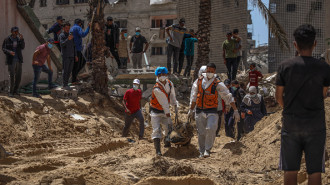Iran frees Belgian aid worker in prisoner swap
Iran on Friday freed a Belgian aid worker, Olivier Vandecasteele, after almost 15 months in custody, in a prisoner exchange for an Iranian diplomat convicted of terrorism.
Belgium's Prime Minister Alexander De Croo said the 42-year-old had arrived in Oman and added: "If all goes to plan, he'll be with us this evening. Free at last!"
Separately, Oman's foreign ministry announced it had helped broker an "exchange deal" and that an Iranian previously held in Belgium was on his way to Tehran.
Iran announced that the freed Iranian is diplomat Assadollah Assadi, who was jailed in Belgium over a 2018 plot to bomb an Iranian opposition rally outside Paris.
Iran's Foreign Minister, Hossein Amir-Abdollahian, tweeted that Assadi, "the innocent diplomat of our country... is now on his way back to his homeland and will soon enter our beloved Iran."
Both Belgium and Iran thanked Oman for its role in securing the release.
Belgium has always insisted that Vandecasteele was innocent and his trial rigged.
He was sentenced in January to 40 years in prison and 74 lashes for "espionage", Tehran's judiciary said at the time.
"Olivier spent 455 days in prison in Tehran in unbearable conditions. Innocent," De Croo said.
"For me, the choice has always been clear. Olivier's life has always come first. It's a responsibility that I take upon myself, that I accept. In Belgium, we do not abandon anyone."
Last year, Belgium and Iran signed a treaty to enable prisoner swap.
Critics of the pact alleged that it would only encourage Tehran to take Belgians hostage for use as bargaining chips to seek the return of agents like Assadi arrested for terror offences in the West.
An exiled Iranian opposition group, the National Council of Resistance in Iran (NCRI), which was the target of the 2018 bomb plot, challenged the treaty in Belgium's constitutional court.
The NCRI reacted furiously to Belgium's decision on Assadi, and claimed it violated the court's order that the intended victims of the bomb plot should be consulted before any prisoner exchange took place under the treaty.
"The release of the terrorist... is a shameful ransom to terrorism and hostage-taking," the group said.
But De Croo's government said that, to win Vandecasteele's release, they opted for another route: invoking a constitutional clause stipulating that the government, acting under the authority of the king, is in charge of international relations.
That meant that for "the Iranian opposition... we didn't warn them beforehand," one government official said.
Another official said that the operation to free Vandecasteele under those terms was dubbed "Mission Blackstone" in reference to 18th-century English jurist William Blackstone known for declaring that: "It is better that 10 guilty escape than one innocent suffer."
Belgian officials denied that any ransom was paid.
Vandecasteele was to land around 2000 GMT in Brussels in a Belgian government jet which had been dispatched with his sister, best friend, diplomats and medical personnel on board, the officials said.
His family had asked Belgian authorities to ensure they could welcome Vandecasteele home "peacefully" without undue media attention. They were to give a news conference on Saturday.
Assadi was an Iranian diplomat based in Vienna, who was arrested after passing explosives to a Belgian-based Iranian couple who were supposed to travel to France to bomb an NCRI rally.
He was arrested in Germany as he tried to return to Austria, and extradited to Belgium where he did not enjoy diplomatic immunity. He was convicted of attempted "terrorist" murder and membership of a "terrorist group".
Tehran angrily protested, but his sentence was upheld in May 2021 when Assadi opted not to appeal.
Belgian officials said they had no choice but to hand over Assadi to get Vandecasteele's released, saying that since the Iranian diplomat's arrest on July 1, 2018, Belgium and its interests abroad were confronted with "an increased threat" from Iran.
"Let there be no mistake about that: the arrest of our compatriot (in Iran) on February 24, 2022 is a direct result, a direct result of what the Belgian judiciary did to the alleged Iranian diplomat and nothing else," one official said.
Earlier this month Iran released a Frenchman, Benjamin Briere, and a French-Irish citizen Bernard Phelan. But it continues to hold two dozen foreigners whom Western capitals and families regard as hostages.



